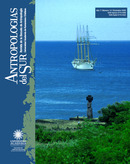Contact
Department of Social and Cultural Anthropology
Oettingenstr. 67
80538 Munich
Room:
U 112
Phone:
+49 (0) 89 / 2180 - 9643
Fax:
+49 (0) 89 / 2180 - 9602
Email:
diego.munoz@ethnologie.lmu.de
Work group
ERC-Project:
Indigeneities in the 21st century: From ‘vanishing people’ to global players in one generation
(ERC Starting Grant, Number 803302)
Principal Investigator: Prof. Dr. Philipp Schorch
Research interests/Area of responsibility
Māori Rapanui, Polynesians in a Latin American State. Imagining a decolonial future for the 21st Century and beyond
Since the 19th century, the Native inhabitants of Rapa Nui (Easter Island) have been part of an interconnected world. After colonial confinement by Chile (1888–1966), they acquired citizenship and, in 1993, the status of Indigenous people in this state. Rapanui people also belong to the “Polynesian triangle”, a concept proposed by archaeologists and linguists to describe a “cultural area” that the Rapanui have appropriated as a vector of identity. In addition, they have become holders of Indigenous rights under international law because Chile ratified the UN declaration on these issues in 2008.
This research studies these three entangled Rapanui identities configured around the notion of decolonization, which Rapanui leaders begin to use in pursuing a possible future for their society. By approaching decolonization as a process and set of ideas and practices directed at establishing self-government, and as an epistemological framework for imagining the future of Indigenous peoples, three major questions will be explored. First, how is decolonization conceptualized locally and what are the identity discourses underlying this? Second, how is the Rapanui society reconfigured in this new situation of applying international treaties concerning the rights of Indigenous peoples? And third, how do the Rapanui imagine their decolonial future and what are the sociocultural aspects involved? The research sets out to analyse this multilayered and aspired decolonization process, both in the local context of Rapa Nui and in its transnational implications.
Career
Diego Muñoz has a PhD in Anthropology and Ethnology from the EHESS, France. Since 2005, he has studied Rapa Nui (Easter Island) from an ethnographic and historical viewpoint. His research focuses on the connections of this society with Chile and French Polynesia, with particular attention to the history of the Rapanui diaspora, the cultural identity making process and the contemporary relationship with the past. In his doctoral thesis, he shows that the Rapanui are part of a diasporic, interconnected world: they are Indigenous people of Chile, belong to the “Polynesian triangle” and are holders of Indigenous rights under international law.
Curriculum Vitae (91 KB)
Recent Publication
|
Rapa Nui: Dilemas contemporáneos |
Publications
- List of Publications 01/2021 (51 KByte)



